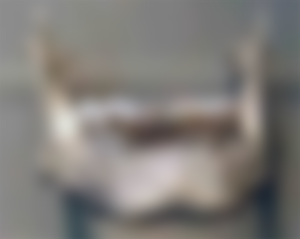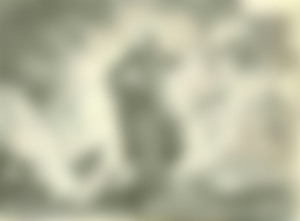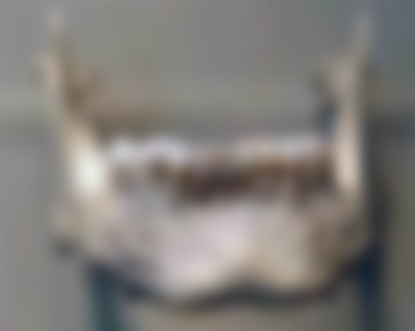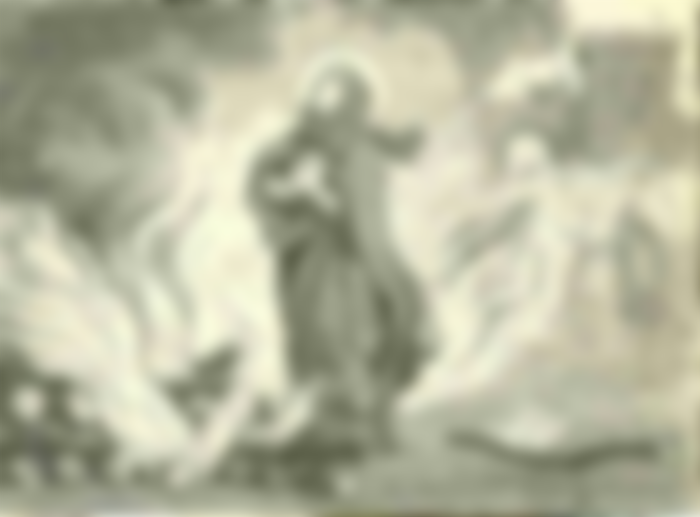"Louis Quatorze", "Le Roi Soleil", King Louis XIV of France (1638–1715), might have been one of the most powerful men in Europe of his time. But in one way you are probably all more privileged than he was: you have access to adequate dentistry. Of course he had dentists, physicians, and surgeons - but they were not very qualified. The consequences of that deeply affected the king's life.
(Below: Le Roi Soleil, King Louis XIV of France in 1670. Engraved portrait by Robert Nanteuil. Public Domain.)

In 1685, King Louis's doctors removed an aching tooth, resulting in an infection, a dangerous condition, and inflammation of gums, jawbones and sinuses. All his upper teeth had to be removed. This operation damaged his palate and jawbone. The infection became chronic. The king lived the rest of his life with a terribly stinking mouth. That might even have affected the court protocol. Louis, well aware of his problem, wanted to keep people at a distance.
Somewhere, I do not now recall where, I read about when author Jack London was in Korea. Staying at a hotel, he was asked to show himself to people who waited outside to see him. Proud to be that famous so far away from home, he complied. But the crowd did not care to see the famous author, they were interested in his loose teeth. He had to stand there taking them out and putting them back again and again - all while the crowd cheered and laughed.
Alfred, Lord Tennyson, described freezing in an unbeatable way:
My teeth, which now are dropt away,
Would chatter with the cold.
I take for granted that none of you want to stink like "Le Roi Soleil", and that you really want to have teeth to chatter from the cold in the winter. Then you may want to take good care of your teeth right from the beginning.
Dentistry already existed in the old high cultures: Egypt, India, Sumer, China. There is evidence of drills being used in the Indus Valley as early as 7000 BC. Both India and Egypt had very advanced methods, including surgery. Abscesses were drained through artificially made holes. They repaired damaged teeth and used some forms of prostheses. Caries was understood as something infectious, although attributed to worms, not bacteria as we know today.
(Below: Repaired teeth from an Egyptian mummy. Image in the Public Domain.)

The first dentist known by name is Hesy-Re, an Egyptian scribe and physician who died about 2600 BC.
The Etruscans are often given the honour of having been the first to use a bridge (about 700 BC). This is not true. The Egyptians evidently used bridges during the fourth dynasty (about 2000 years earlier), and that is just the earliest evidence we have – it says nothing of when and where they really began.
The father of modern dentistry is Pierre Fauchard (1678–1761), a French physician, who wrote the famous book "Le chirurgien dentiste" (1728). Amongst other things, he was the first who suggested that sugar is a cause of decay. He also suggested urine as a treatment for mild caries. This, actually a very old method which works excellently, never received the attention it deserved. Before Fauchard, Ambroise Paré (1510?–1590), "the Father of Surgery", wrote about teeth. But the first European book on this subject was the German "Artzney Buchlein", published in 1530 (or 1531). Basically, Europe had no dentistry beyond extraction before the 16th century, and that was an operation carried out by monks and barbers.
The Catholic, the Coptic, and the Eastern Orthodox Churches recognise a Patron Saint of dentistry, Saint Apollonia. Her feast is held on the 9th of February. Invoking her is said to protect against toothache. Dionysius, Bishop of Alexandria (247–265), wrote to Fabius, Bishop of Antioch, concerning the mob's behaviour associated with the celebration of Rome's 1000 years of existence:
"[...] These men seized her also and by repeated blows broke all her teeth. They then erected outside the city gates a pile of fagots and threatened to burn her alive if she refused to repeat after them impious words. Given, at her own request, a little freedom, she sprang quickly into the fire and was burned to death."
Her teeth were broken, and she was considered qualified for being the protector of dentistry. This happened in Alexandria, in Egypt - probably in the year 249 AD.
(Below: St. Apollonia. Image in the Public Domain.)

Many people have problems with their teeth, not only in the past, although under ideal conditions they would certainly remain intact for 100 years of use (or more). While such ideal conditions no longer exist naturally (although they may have in the past), we have to try to make up for that by deliberate efforts, as best as we can.
Health of the teeth and health of the gum are interdependent, and the basis for both is diet, which works on several levels.
It is common knowledge that good nutrition is essential for growing teeth. But many people fail to see that a full-grown tooth is not a once-and-for-all finished piece of dead substance. It is living matter and has an ability for regeneration and defence, just as any other tissue of the body. Bacteria are fought off, damages are repaired, etc. For this to work properly, it is like everywhere else in the body; you need a good local blood circulation and a sufficient amount of the required nutrients.
The local blood circulation requires heavy chewing. This area is made for hard work, but modern food, cooked to a soft consistency, will not provide sufficient resistance. We need to choose suitable food deliberately and increase the exercise of our "chewing muscles", which provides massage of the whole area.
To get a sufficient amount of the essential nutrients, no food available today would suffice. We may choose the best we can find, but in addition to that we have to take dietary supplements.
The enamel is a special tissue, since it is mainly nourished from the outside. The saliva contains enzymes and substances for repairing and hardening it. Getting a well-balanced saliva requires proper nutrition in the first place. A deficiency of e.g. manganese will manifest itself as an increased frequency of caries, because the saliva contains a compound based on manganese, which protects the enamel. Another element, molybdenum, is required for the enamel to assimilate fluoride, just to mention a few.
Saliva is a bio-chemical liquid with important functions, and it is important to keep its chemical balance optimal. This is done best by ensuring an optimal intake of the relevant nutrients.
In addition to this, both the teeth and the gum have a certain ability to assimilate certain nutrients from the "outside", that is from the mouth, without passing through the digestion and the blood.
A third important factor (beside nutrition and chewing) is the microbalance - the composition of microbes (bacteria, fungi, etc.) which are living in the mouth. Basically there are bad ones which are causing harm, and good ones which are not, and which can protect us from the bad ones.
Modern diet actually cultivates the bad ones, causing caries (decay), plaque, inflammation, and paradentosis – and they are overwhelmingly dominant in a vast majority of human mouths today. This is why we have to spend so much time and attention to oral and dental hygiene. We simply have to remove the bacteria, the rest of the stuff that feeds them, and the substances they produce.
Read the whole series:
1. Dentistry - A Modern Luxury? Why Do We Need It?
2. Preserve Your Teeth: Nutrients & Other Beneficial Substances
3. Take Care of Your Teeth: Hygiene, Prevention & Reparation of Damage
4. Animal Teeth, Sabre-Toothed Tigers & Dragon's Teeth
5. Supplement to Teeth: Etymology & Glossary
Copyright © 2007, 2018, 2021 Meleonymica/Mictorrani. All Rights Reserved.
Here you can find my articles about History, and here are my articles about Health.
Interested in history, legends and myths, join my community History, Myths, Legends & Mysteries (be45). Interested in Health & Medicine, join The Mechanisms of Health (d52e).
You find all my writings on Read.Cash, sorted by topic, here.



Ugh. I'm supposed to have oral surgery once my insurance approves of the operation. So glad I'm living right now where I can gas my worries and pains away!